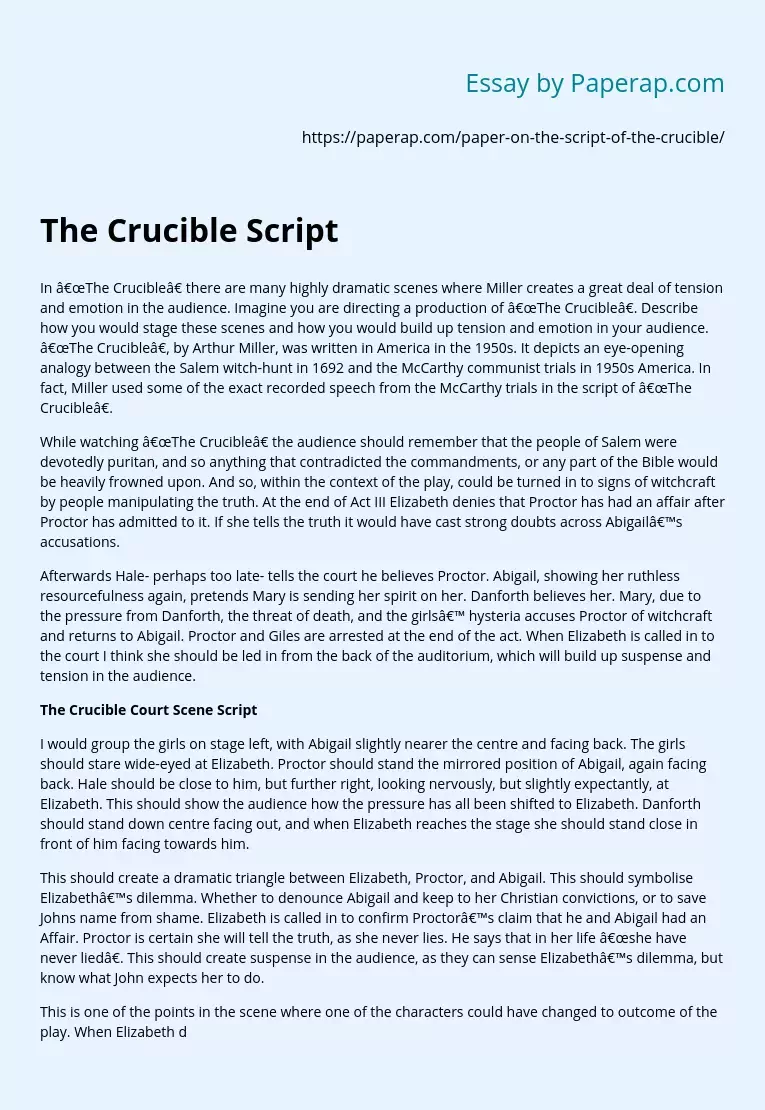The Crucible Script
In “The Crucible” there are many highly dramatic scenes where Miller creates a great deal of tension and emotion in the audience. Imagine you are directing a production of “The Crucible”.
Describe how you would stage these scenes and how you would build up tension and emotion in your audience. “The Crucible”, by Arthur Miller, was written in America in the 1950s. It depicts an eye-opening analogy between the Salem witch-hunt in 1692 and the McCarthy communist trials in 1950s America. In fact, Miller used some of the exact recorded speech from the McCarthy trials in the script of “The Crucible”.
While watching “The Crucible” the audience should remember that the people of Salem were devotedly puritan, and so anything that contradicted the commandments, or any part of the Bible would be heavily frowned upon. And so, within the context of the play, could be turned in to signs of witchcraft by people manipulating the truth. At the end of Act III Elizabeth denies that Proctor has had an affair after Proctor has admitted to it.
If she tells the truth it would have cast strong doubts across Abigail’s accusations.
Afterwards Hale- perhaps too late- tells the court he believes Proctor. Abigail, showing her ruthless resourcefulness again, pretends Mary is sending her spirit on her. Danforth believes her. Mary, due to the pressure from Danforth, the threat of death, and the girls’ hysteria accuses Proctor of witchcraft and returns to Abigail. Proctor and Giles are arrested at the end of the act.
When Elizabeth is called in to the court I think she should be led in from the back of the auditorium, which will build up suspense and tension in the audience.
The Crucible Court Scene Script
I would group the girls on stage left, with Abigail slightly nearer the centre and facing back. The girls should stare wide-eyed at Elizabeth. Proctor should stand the mirrored position of Abigail, again facing back. Hale should be close to him, but further right, looking nervously, but slightly expectantly, at Elizabeth. This should show the audience how the pressure has all been shifted to Elizabeth. Danforth should stand down centre facing out, and when Elizabeth reaches the stage she should stand close in front of him facing towards him.
This should create a dramatic triangle between Elizabeth, Proctor, and Abigail. This should symbolise Elizabeth’s dilemma. Whether to denounce Abigail and keep to her Christian convictions, or to save Johns name from shame. Elizabeth is called in to confirm Proctor’s claim that he and Abigail had an Affair. Proctor is certain she will tell the truth, as she never lies. He says that in her life “she have never lied”. This should create suspense in the audience, as they can sense Elizabeth’s dilemma, but know what John expects her to do.
This is one of the points in the scene where one of the characters could have changed to outcome of the play. When Elizabeth denies her husband is a “lecher” replying timidly to Danforth’s ferocity “No, sir” I would have the whole court freeze except Elizabeth and a spotlight on her when she says the line “No, sir”, then instantly the lights should come back up, and the action continue. This should again build up huge tension in the audience in the wait for Elizabeth’s decision. When it comes the will be very taken aback, but will not be given time to recover as the action will continue quickly.
The speed of Danforth’s reaction seems to suggest that this was the answer he wanted, as it is quick and dismissive of the appeals. This is shown as he immediately orders the Marshal to “Remove her”. This I think is because if she had not denied the affair it would have also left serious questions about Danforth’s skills of judgement. Hale then tells the court that he “believe” s Proctor and tells the court he has always “struck me true”. I think the audience would be thinking this has come too late.
To emphasise this Danforth should ignore him, walking back to his bench, not even turning to say, “she spoke nothing of lechery, and this man has lied”. During this I would make Proctor place his head in his hands, and the girls passing very discreet smirks between one another. When Hale says “[pointing at Abigail] This girl has always struck me false. She has-” and Abigail cuts him off. Here we again see how Abigail uses her position of power in the court. She suddenly cuts in about the “yellow bird” saying “You will not! Begone! Begone, I say! ” this suddenly draws attention away from the people who are doubting her.
The Crucible Script. (2019, Dec 05). Retrieved from https://paperap.com/paper-on-the-script-of-the-crucible/

